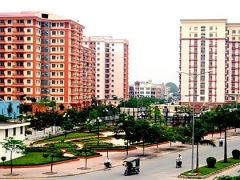Investors yet to see sale-off in property market

Foreign investors coming to Vietnam expect local property investors to discount their products by a half or two-third, like in South America, but this expectation has never come true, said Le Xuan Nghia, vice chairman of the National Financial Supervisory Committee, at a conference on opportunities for the local realty market in 2012 held by Vietstock recently in Ho Chi Minh City.
The Asian region still maintains its growth momentum, he said, and Vietnamese property price drop is not due to any sale-off but the monetary tightening policy.
It is a temporary pressure, and when the policy is adjusted, the real estate market will grow again.
Nghia said the major financial source for the local property market is banks. Therefore, the important issue is whether lending rates will be lowered and how and when it happens.
In some countries, though the crisis has passed, interest rates are not reduced yet because the liquidity of the banking system is still in trouble.
Depositors have yet to believe in sustainable macro-economic situation; borrowers have yet to believe that the business environment will become favorable; and lenders are not convinced that the market is free of risks.
The fact that all the three parties are hesitant and afraid results in a decline in deposits and liquidity. Bad debts continue to surge, putting a burden on the banking system as well as the entire economy.
“Vietnam is experiencing the same situation,” Nghia said.
Although inflation has started to fall, interest rates cannot be lowered immediately as banks are struggling with liquidity problems, which stem from bad debts, most of which are related to the property sector, Nghia said.
Dang Hung Vo, former Deputy Minister of Natural Resources and Environment, shared Nghia’s view, saying that sale-off hasn’t occurred in Vietnam, despite discounts here and there.
The realty market currently revolves around capital sources, which are encountering difficulties because of banks’ liquidity problems.
Moreover, even when credit is loosened, hardly any investor can afford the current interest rate.
Nghia said addressing the liquidity problem is very difficult.
Several measures are being deployed, including increasing money supply and regulating capital between banks.
“If liquidity of the banking system saw positive changes in the second quarter, bank interest rates might cool down in the third and the fourth quarters,” Nghia said.
Last December, the Government issued a directive on the property market, stipulating stricter management of the market and credit flexibility for borrowers of certain loans, excluding those for new construction and speculation.
Several financial measures are under study and will likely be carried out this year to provide the market with more capital sources other than bank loans.
Particularly, the Ministry of Construction has submitted a scheme on a housing development saving fund and is gathering opinions from relevant agencies.
This is a close-end fund that will provide loans for social housing development and investment in housing for low-income earners.
Fund participants can apply for a home loan after contributing an equivalent amount to 30 per cent of the house price.
The loans will be three times of the contributions with a lending period of 15 years and annual interest rates equal to half of the deposit rates plus one or two percentage points.
The fund will publicize contributions of its participants, along with its financial information. HCMC and Hanoi will pilot the fund in the next few months.
In addition, the scheme for establishing the housing development bank is being compiled for submission to the Prime Minister. The pivotal role will go to the Mekong Delta Bank, or a financial company under the central bank which specializes in housing and home loans.
Unlike the housing saving fund, the bank will be financed by official development assistance (ODA) capital, the State budget, government bonds and housing bonds.
Especially, the bank will only provide loans for buying and renting houses with preferential interest rates in 15-20 years, not for housing project development.
“The realty market can only develop in a sustainable fashion with strong support from buyers,” Nghia said.
However, if the housing fund scheme is rolled out this year, it will take 3-5 years for the fund to take effect given the time needed to mobilize contributions. The property lending bank scheme may bore fruit earlier, but the capital ranging from VND5-10 billion is little compared to the market’s demand.
These two financial institutions will help the market avoid unexpected fluctuations, Nghia said.
At present, the low-cost housing segment is playing the leading role in the market. Experts predicted the local property market from now to 2020 would mostly focus on this segment.
With many measures being implemented, Nghia forecast the real estate market would gradually warm up and prosper in 2013 and the following 4-5 years.
What the stars mean:
★ Poor ★ ★ Promising ★★★ Good ★★★★ Very good ★★★★★ Exceptional
Related Contents
Latest News
More News
- Vietnam breaks into Top 10 countries and regions for LEED outside the US (February 05, 2026 | 17:56)
- Fairmont opens first Vietnam property in Hanoi (February 04, 2026 | 16:09)
- Real estate investment trusts pivotal for long-term success (February 02, 2026 | 11:09)
- Dong Nai experiences shifting expectations and new industrial cycle (January 28, 2026 | 09:00)
- An Phat 5 Industrial Park targets ESG-driven investors in Hai Phong (January 26, 2026 | 08:30)
- Decree opens incentives for green urban development (January 24, 2026 | 11:18)
- Public investment is reshaping real estate’s role in Vietnam (January 21, 2026 | 10:04)
- Ho Chi Minh City seeks investor to revive Binh Quoi–Thanh Da project (January 19, 2026 | 11:58)
- Sun Group launches construction of Rach Chiec sports complex (January 16, 2026 | 16:17)
- CEO Group breaks ground on first industrial park in Haiphong Free Trade Zone (January 15, 2026 | 15:47)

 Tag:
Tag:




















 Mobile Version
Mobile Version